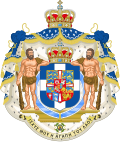| King of the Hellenes | |
|---|---|
 | |
| Details | |
| Style | His Majesty |
| First monarch | Otto |
| Last monarch | Constantine II |
| Formation | 27 May 1832 |
| Abolition | 1 June 1973 |
| Residence |
|
| Pretender(s) | Pavlos |
Monarchy of Greece (Greek: Μοναρχία της Ελλάδας, romanized: Monarchía tis Elládas) or Greek monarchy (Greek: Ελληνική Μοναρχία, romanized: Ellinikí Monarchía) is the constitutional form of government by which a hereditary sovereign (Basileus) reigns as the head of state of Greece. Monarchy in Greece lasted from 1832 to 1924 and from 1935 to 1973.[1]
YouTube Encyclopedic
-
1/5Views:1 544 788192 054246 7072 610305 089
-
King Constantine II: The Last Monarch Of Greece | A King's Story | Real Royalty
-
Why Doesn't Greece Have a King? | The Rise of the Hellenic Republic
-
Constantine II, Ex King of Greece & A Brief History of Greece
-
Who Would Be the King of Greece Today?
-
The Last King Of Greece: King Constantine | Timeline
Transcription
History
The monarchy of Greece was created by the London Conference of 1832 at which the First Hellenic Republic was abolished.[citation needed] The Greek crown was originally offered to Prince Leopold of Saxe-Coburg and Gotha but he declined, later being elected the king of the Belgians.
In 1832, Prince Otto of Bavaria of the House of Wittelsbach was styled "His Majesty Otto I, King of Greece", over which he reigned for 30 years until he was deposed in 1862.[2] After Otto's deposition as king, the crown was offered to many others, including the novelist and former British colonial secretary Edward Bulwer-Lytton.[3]
A head of state referendum was held in 1862 to name a new king. The vast majority of Greek people wanted Prince Alfred, Duke of Edinburgh, to be their new king.[4][5] He won the referendum by 230,016 against the Duke of Leuchtenberg. Alfred declined to be king, and so did every candidate until Prince Vilhelm of Denmark of the House of Glücksburg, who had received only six votes. Vilhelm was elected unanimously by the Greek Assembly, and became "His Majesty George I, King of the Hellenes".
There was a referendum in 1920 to restore Constantine I as monarch, but four years later the Second Hellenic Republic was established and the monarchy was abolished following a referendum in 1924. Then in 1935 the monarchy was restored after a referendum and maintained after a referendum in 1946.
In July 1973 the Greek military junta called a referendum, which abolished the monarchy for the second time in Greek history. Then in 1974, the democratically elected prime minister, Konstantinos Karamanlis, called a referendum which legitimately confirmed the abolition.
Residences
Tatoi was the private residence and 10,000-acre estate outside of Athens originally bought by King George I in the 1870s. The property was seized by the Republic following the 1974 referendum and has long been a contentious issue between the former royal family and the Greek state.
The Old Royal Palace (Greek: Παλαιά Ανάκτορα, romanized: Palaiá Anáktora) is the first royal palace of modern Greece, completed in 1843. It has housed the Hellenic Parliament since 1934. The Old Palace is situated at the heart of modern Athens, facing onto Syntagma Square.
Kings of Greece
Royal consorts
Regents of Greece
Insignia
-
Monogram of Otto I
-
Monogram of George I
-
Monogram of Constantine I
-
Monogram of Alexander I
-
Monogram of George II
-
Monogram of Paul I
-
Monogram of Constantine II
See also
- Basileus
- Greek crown jewels
- Greek royal family
- List of heads of state of Greece
- List of heirs to the Greek throne
References
- ^ Lakritz, Talia. "10 countries that abolished their own monarchies". Insider. Retrieved 2023-06-29.
- ^ "Otto | king of Greece | Britannica". www.britannica.com. 2023-05-28. Retrieved 2023-06-29.
- ^ Conliffe, Ciaran. "Edward Bulwer-Lytton, Writer And Politician". headstuff.org.
- ^ Boston, Greek (2020-05-06). "Get to Know Prince Alfred Ernest Albert". www.greekboston.com. Retrieved 2023-06-29.
- ^ "Which other European royals is Prince Philip related to?". South China Morning Post. 2021-03-21. Retrieved 2023-06-29.
Most of the Greeks wanted Prince Alfred – the second son of Queen Victoria and Albert – to be king, but he declined.









